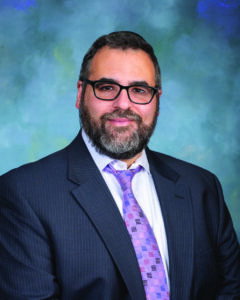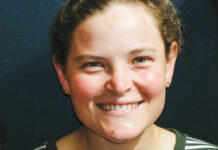Over the course of the 23 years he has spent working at Beth Tfiloh Dahan Community School, Rabbi Mordechai Soskil has filled many roles as an educator.

He has taught classes, served as the principal of Beth Tfiloh’s middle school and currently works as the director of Judaic studies in Beth Tfiloh’s high school. He serves as a mentor not only for students, but for other teachers whose classes focus on the Talmud and rabbinical studies.
Much of his work centers on Jewish ethics and how they apply to hot topics in modern society, most recently technologies like AI, ChatGPT and virtual reality. In teaching, his goal is to make Jewish law and ethics relevant to teenagers in their daily lives, applying the concepts to subject matter not typically associated with Judaism.
“I love being able to help open up teens to thinking about their heritage and helping to make Judaism feel relevant, interesting and important,” he said of his work.
Soskil, 49, lives in Cheswolde in Northwest Baltimore with his wife, Allison, and three of their six children. The family attends Congregation Shomrei Emunah.
Originally from Queens, New York, he and his wife moved to Baltimore in 1994 and have lived here ever since, except for a three-year period when he worked as the Judaic studies principal for the middle and upper schools at the Maimonides School in Brookline, Massachusetts.
Though his parents were very active in the world of Reform Judaism, Soskil took interest in the Orthodox lifestyle at a formative age, and this interest ended up shaping much of the rest of his life.
Soskil said he sees himself as a teacher and mentor before he sees himself as a rabbi. He first became interested in pursuing rabbinical studies in his early twenties.
“As a kid, I didn’t think about being a rabbi. I wanted to be a fireman, or a space policeman, or whatever,” he quipped.
Because of the fact that he has been a teacher at Beth Tfiloh for so many years, he has seen the school undergo many changes over time. Soskil noted that one of the biggest changes over the years has been the students he teaches, and how teachers approach them.
“I think nowadays we have a much more profound insight into [their] social and emotional development and growth,” he explained. “I think we have a much more profound insight into helping students grow up with healthy relationships with themselves and others. That’s very different from how things were 20 years ago.”
He added that the integration of technology into the classroom is also a fairly recent development. The usage of computers in the classroom has become more common, as well as educational technology such as Smart Boards.
But the more things change, the more they stay the same — and his goal of making Jewish law relevant to students in their daily lives has never wavered.
“Teaching and students have changed, but what has not changed is our passion for Jewish texts and keeping them relevant and interesting to teenagers,” Soskil said. “Using Jewish philosophy in relation to contemporary issues can challenge where their own ethics come from and how they develop. It’s always been fascinating.”
In addition to his educational work, Soskil is also a writer. In 2019, he published “Questions Obnoxious* Jewish Teenagers Ask: *And By Obnoxious I Mean Really Smart and Insightful, Just Like You,” a compilation of common questions he has received over his years spent working with teenagers. The questions cover Jewish views on life and its meaning, as well as rituals like davening.
“Sometimes teens don’t ask because they think their questions are so powerful that if they got out the whole system of Torah will crumble under the weight of the question,” he wrote in the book’s description.
Soskil also writes for The Times of Israel, with much of his pieces focusing on the Jewish family and on biblical concepts.
“I try to find ways to connect a reading or holiday to something that’s going on in my life in a way that I think would be interesting for the reader,” he explained. “I find that personal stories make an impression on students, so I think about things that have happened to me and try to explain them in the context of Torah readings.”







